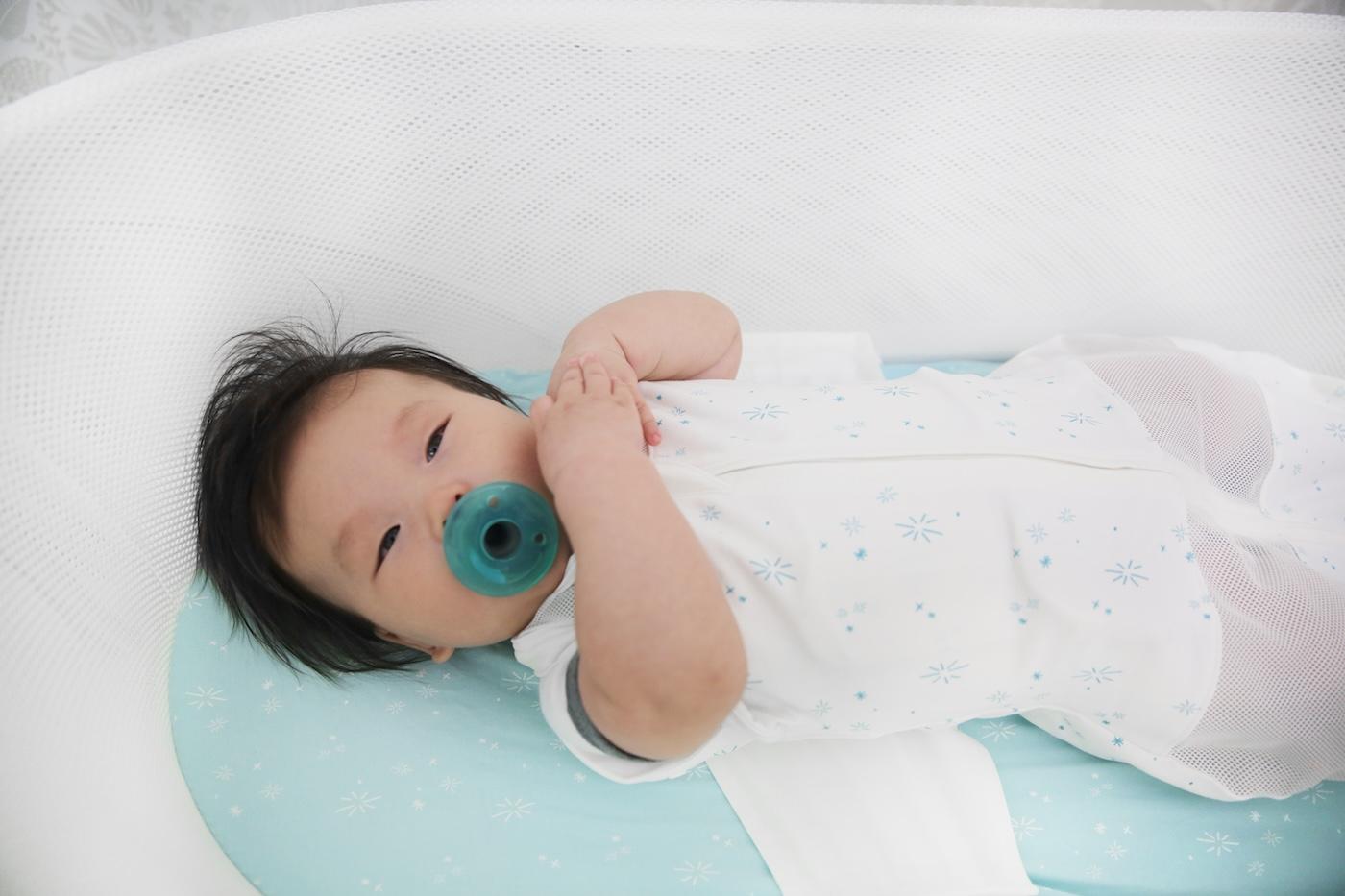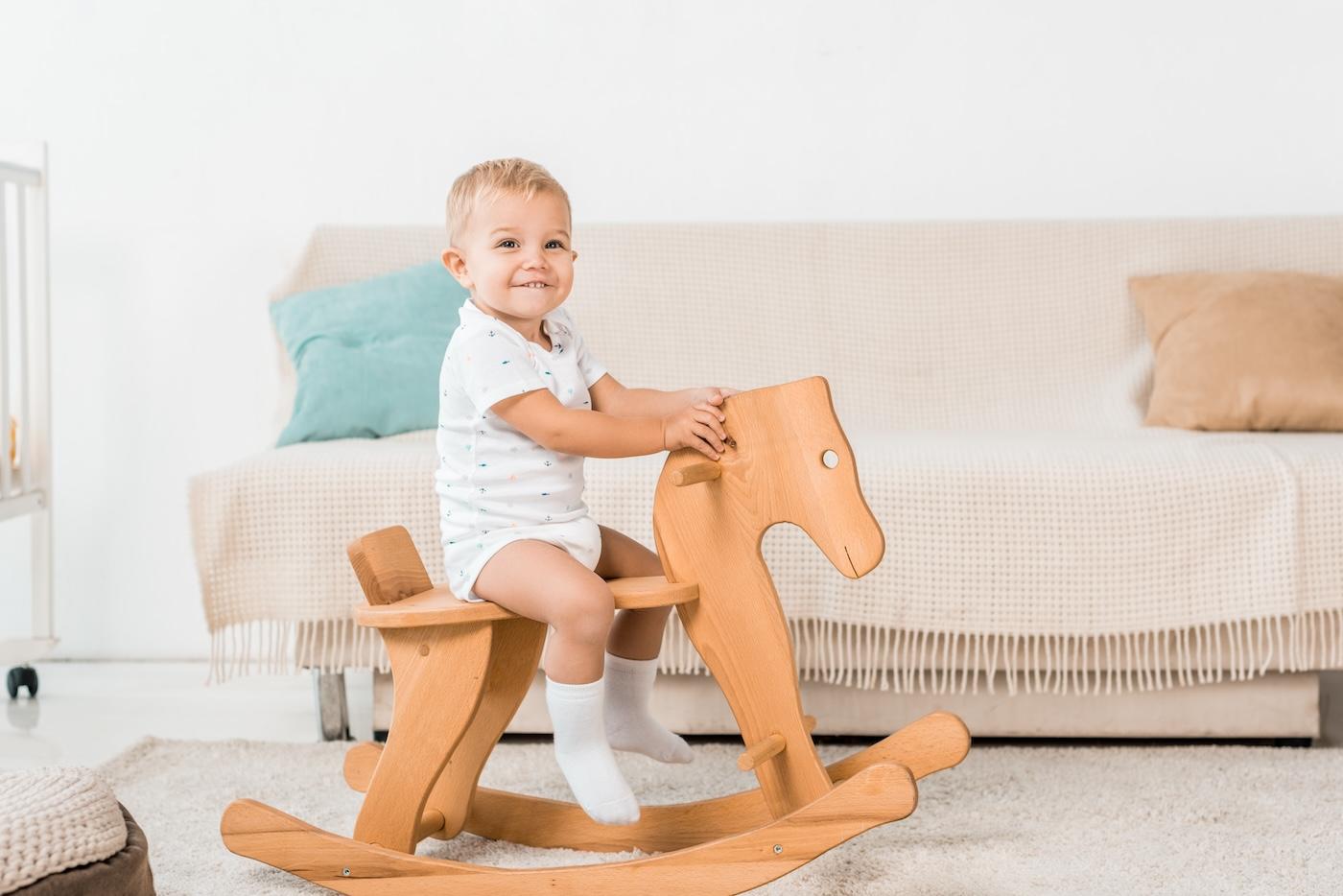BABY
How to Help a Constipated Baby
When hard poop may be a sign of something more serious.

Written by
Dr. Harvey Karp

Did you ever dream that poop would be on your mind this much?! Counting diapers, commenting on their contents, writing down what your baby’s stool looks like…The glamorous life of a new parent! But constipation in infants and babies is a common issue—and something parents need to be aware of. Here’s what you need to know:
What is baby constipation?
Infant constipation is usually marked by hard stools. Your baby may be constipated if they have difficulty pooping, have hard or pellet-like bowel movements, cry when they make a poop, or have infrequent or irregular bowel movement. (Craving more poop knowledge? Learn all there is to know about newborn poop!)
How often should my formula-fed baby poop?
Newborns often have a lot of bowel movements, sometimes dirtying diapers after each feed! But after the first couple of weeks, babies usually settle into a pretty consistent pooping routine. For formula-fed babies, that means often having one to three dirty diapers most days, but don’t be too surprised if they have one no-poop day once in a while. Remember, frequency varies, so don’t be too alarmed if your baby doesn’t quite fit into these pooping parameters.
How often should my breastfed baby poop?
Just like their formula-fed counterparts, breastfed babies produce a lot of poopy diapers during their first few weeks, often moving their bowels after every feeding. Beyond that, bowel movement frequency in breastfed babies can run the gamut! Your little one may dirty their diaper five times a day—or only poop once every few days.
How do I know if my baby is constipated?
Is your baby pooping every day? Great! That is a sign that they’re properly absorbing nutrients and disposing waste. But not pooping daily doesn’t necessarily mean your baby is constipated. (For one, it’s not unusual for an exclusively breastfed baby to have a few poop-free days.) Also, not a sign of baby constipation: a little straining and grunting to get that poo out! For babies, moving their bowels can be a huge effort! After all, their tiny abdominal muscles are still pretty weak. So, what are signs that your baby is constipated? Your little one may be constipated if…
- They’re passing dramatically fewer stools than usual
- Baby is straining for 10 minutes or more before making a poop
- Baby’s stools appear unusually hard, dry, and/or pellet-like
- Their stool contains blood
- Baby’s belly appears bloated or swollen
- Baby arches their back or cries when passing stool
- Baby is excessively fussy
- They’re spitting up more often
What causes constipation in babies?
Constipation in babies is primarily caused by diet. Here are some possible reasons your baby may be dealing with constipation that you might want to discuss with your pediatrician:
- Swapping feeding methods: If your once-breastfed baby goes from breastmilk to infant formula, constipation can result. (The same holds true for mostly formula-fed babies who are now taking in more breastmilk.)
- New baby formula: Some babies’ intestines are just sensitive to particular brands of formula—or even particular types of preparation. That means that going from one brand to another or swapping powdered infant formula for concentrate might be causing constipation in your baby.
- Dairy or soy allergy: Babies who have milk allergies can experience constipation, excessive gas, and other discomforts. A doctor can determine if your baby has a dairy or soy allergy.
- Introducing solid foods: Sometimes when babies are given the green light for baby food, you’ll notice changes in the color, texture, smell, and frequency of your bub’s poop. Not only is your baby’s digestive system still figuring out how to break down these new nutrients, many first-time foods, like rice cereal, are very starchy.
- Iron supplement: Vitamins with iron can make poops into hard little black-green colored pellets. That means, infants who need iron drops may also need specific diet tweaks or treatments to resolve the issue.
- Dehydration: If your baby isn’t getting enough to drink, their stools can get drier and harder. Unsure if your baby is dehydrated? It’s actually super easy to check: Your baby might be dehydrated if the inside of their mouth is dry and sticky, they’re peeing fewer than six times a day, and/or their urine is more yellow and a bit smelly.
- Illness: When your little one is under the weather, there’s a good chance that they’re not eating or drinking like they normally do, which can result in constipation.
Safe and Effective Baby Constipation Remedies
Constipation is common and can be safely treated with a number of natural remedies. Here are my go-to baby constipation treatments:
- Offer a tiny bit of fruit juice. If your constipated baby is at least a month old, you can give them a wee bit of 100% apple or pear juice. (I prefer organic, if you can.) Sugar from the fruit draws fluid into the intestines, helping to loosen stool. While fruit juice is not recommended for babies, in the case of constipation, offering roughly a tablespoon of prune juice to your baby’s bottle once or twice a day is okay.
- Change your baby’s formula. Starting a new formula may resolve constipation. Some infants have softer stools when they drink formula from concentrate versus powder-based (or vice versa). But please, ask your baby’s doctor for guidance before swapping. (By the way, the iron levels in infant formula don’t cause or worsen constipation, so changing your baby to a low-iron formula isn't a recommended constipation solution.)
- Try different foods. White foods (like rice, dairy, bananas) can bind a baby up. But certain high-fiber foods like beans, broccoli, plums, prunes, and spinach can help get your bub’s pooping back on a regular schedule. Also, consider substituting barley cereal for your baby’s rice cereal.
- Give a bit of water. Depending on your baby's age, you might be able to give your baby 2 to 4 ounces of water…just be sure to check in with your doctor beforehand.
- Do these baby exercises. Babies trying to poop often have a hard time squeezing their stomach muscles and relaxing the rectum at the same time. They accidentally tighten the anus when they should be easing it. To relax your baby’s anus, bicycle their legs and gently press their knees down to their tummy a few times.
- Give your baby a massage. For a bowel-moving baby massage, use your fingertips to “draw” an oval underneath your baby’s belly button. Move your fingers clockwise, which follows your baby’s digestive tract. Afterward, walk your fingertips diagonally, making an X from one side of your baby’s belly to the other. Repeat as needed.
- Try the thermometer trick. If bicycling and massage fail, you can insert a Vaseline-greased thermometer (or a cotton swab) just one-half to one inch into your baby’s anus. Don’t worry: This does not hurt! Babies usually respond to this by bearing down to push the object out…often pushing poop out at the same time!
Skip These Baby Constipation “Remedies”
Never give your infant mineral oil, stimulant laxatives, or enemas to treat constipation. And never offer your baby honey or corn syrup as a laxative before their first birthday. Always ask your pediatrician before giving either to your baby as a constipation remedy…even if they are over 12 months old.
What if Baby is passing gas but not stool?
You may notice that your baby is still passing gas but isn’t pooping. Try not to worry! This probably isn’t cause for concern. Some babies just get gassy in between poops without being constipated. In most cases, a baby’s gas and constipation will resolve on their own. Remember, a baby’s digestive system is brand new...so it’s still getting the hang of how to function.
When is baby constipation a sign of something serious?
The good news is baby constipation usually isn’t serious. However, chronic constipation may lead to complications—or signal an underlying health issue. (Chronic constipation means that the issue persists for several weeks or longer.) My baby constipation rule of thumb is this: Call your baby’s doctor if more than three days pass without a poop. Call even sooner if your baby has a weak cry, weak suck, or is acting ill. Again, three days does not necessarily mean there is a problem...but it’s a good idea to see what your pediatrician has to say.
If constipation is persistent—or your baby is acting weak or ill—the doctor may want to check your little one out and perhaps screen for rare issues that can sometimes masquerade as constipation:
- Hypothyroidism: A totally curable condition caused by an underactive thyroid gland. If left untreated, hypothyroidism is a serious problem because it may slow mental development.
- Hirschsprung’s disease: This birth defect occurs when the nerves in the rectum don’t develop properly. The baby’s rectal muscles tightly clench—unable to relax—which blocks the poop from passing and causes intestinal obstruction. Fortunately, this problem can be corrected with surgery.
- Infantile botulism: A rare disease characterized by several days of progressive weakness (starting with the face and neck and potentially leading to total paralysis). It’s caused by botulism spores hiding in liquid-y sweets, such as honey or corn syrup. While these are safe for older children, they should never be given to babies under 1 year of age.
Disclaimer: The information on our site is NOT medical advice for any specific person or condition. It is only meant as general information. If you have any medical questions and concerns about your child or yourself, please contact your health provider. Breastmilk is the best source of nutrition for babies. It is important that, in preparation for and during breastfeeding, mothers eat a healthy, balanced diet. Combined breast- and bottle-feeding in the first weeks of life may reduce the supply of a mother's breastmilk and reversing the decision not to breastfeed is difficult. If you do decide to use infant formula, you should follow instructions carefully.
SHARE THIS ARTICLE
PARENT PICKS
Bestsellers



















